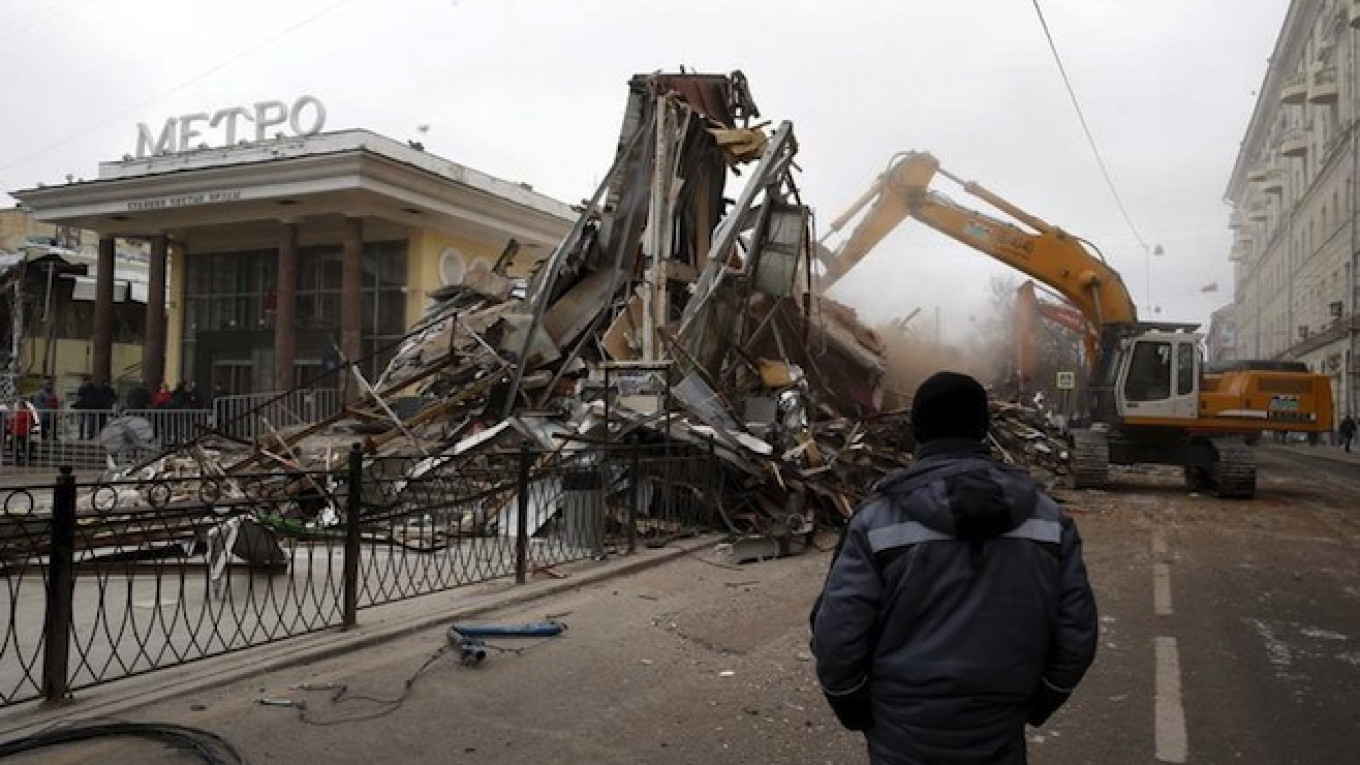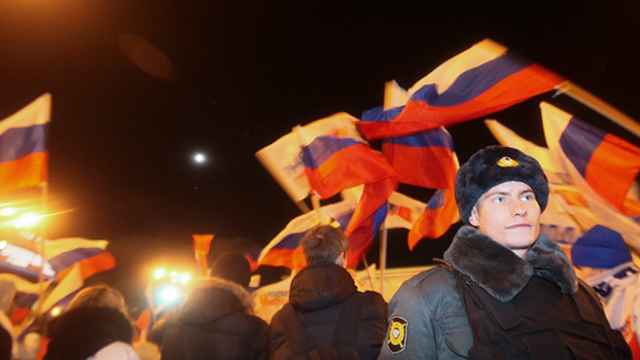
If you've been on a 36-hour flight or locked in a cabin in the woods, you might have missed the news that almost 100 buildings were destroyed in Moscow overnight. But it wasn't a war or terrorist attack. It was the Moscow government putting your tax rubles to work.
Because this was a special operation, the city government and media are using special terminology to describe it. To help you understand it, I've put together a little primer.
Снос: demolition, the orderly dismantling of a structure. The party line: В ночь на 9 февраля под снос пошло около сотни торговых точек (On the night of Feb. 9 about 100 shops were taken down). The real story: Hundreds of bulldozers appeared in the middle of the night and smashed to smithereens several million dollars' worth of real estate.
Киоски, палатки и павильоны: kiosks, stalls, and pavilions, i.e. small, flimsy trading booths. The party line: Минувший ночью начался демонтаж павильонов, без разрешения возведенных рядом со станциями метро (Last night work began to demolish stalls that had been put up next to metro stations without permission.) The real story: Solid, stone one-, two- and three-story buildings, hooked up to utilities, with licenses, deeds, and court orders certifying their legal status were destroyed.
Самовольная постройка: unauthorized structure, also called самострой (shanty), незаконная постройка (illegally built structure). The party line: Москва избавляется от опасного самостроя (Moscow is getting rid of its dangerous shanties). The real story: Perfectly safe, authorized, inspected buildings were destroyed for no clear reason.
Признанный: adjudicated, declared, determined, i.e., status granted as the result of a legal process. Party line: В разных районах начался снос торговых киосков, палаток и павильонов, признанных столичным правительством потенциально опасным самостроем (In various districts, demolition began of trading kiosks, stalls and pavilions that were determined by the city government to be potentially dangerous illegal construction.) The real story: After every court ruled in favor of the store owners, the city decreed they could tear down buildings without a court order.
Стихийный: primitive, cobbled together, i.e., something that appeared spontaneously. Party line: По словам специалистов, стихийные конструкции могут представлять угрозу для важных городских коммуникаций (Specialists say that these structures, which were quickly thrown up, might be a threat to key city utility lines.) The real story: Although all these solid buildings that have stood for up to 20 years are fully licensed and inspected, my brother-in-law and his buddy said that in a hurricane phone lines might be affected.
So if you read the official news reports, it sounds like a bunch of ugly, illegally constructed market stalls and shanties were torn down to protect citizens' health and safety.
But here's what the free press — well, Facebook — says about it:
It was called: Ночь длинных ковшей (Night of the long diggers); Ночь хрустальных ларьков (Night of the crystal stalls); or just: сегодняшний погром (today's pogrom). Someone wrote that is looked like "Москва подверглась варварской бомбардировке" (barbaric bombing raids hit Moscow).
What I say is: Свято место пусто не бывает (Nature abhors a vacuum).
Let's see how empty those lots are in six months.
Michele A. Berdy, a Moscow-based translator and interpreter, is author of "The Russian Word's Worth" (Glas), a collection of her columns.
A Message from The Moscow Times:
Dear readers,
We are facing unprecedented challenges. Russia's Prosecutor General's Office has designated The Moscow Times as an "undesirable" organization, criminalizing our work and putting our staff at risk of prosecution. This follows our earlier unjust labeling as a "foreign agent."
These actions are direct attempts to silence independent journalism in Russia. The authorities claim our work "discredits the decisions of the Russian leadership." We see things differently: we strive to provide accurate, unbiased reporting on Russia.
We, the journalists of The Moscow Times, refuse to be silenced. But to continue our work, we need your help.
Your support, no matter how small, makes a world of difference. If you can, please support us monthly starting from just $2. It's quick to set up, and every contribution makes a significant impact.
By supporting The Moscow Times, you're defending open, independent journalism in the face of repression. Thank you for standing with us.
Remind me later.








